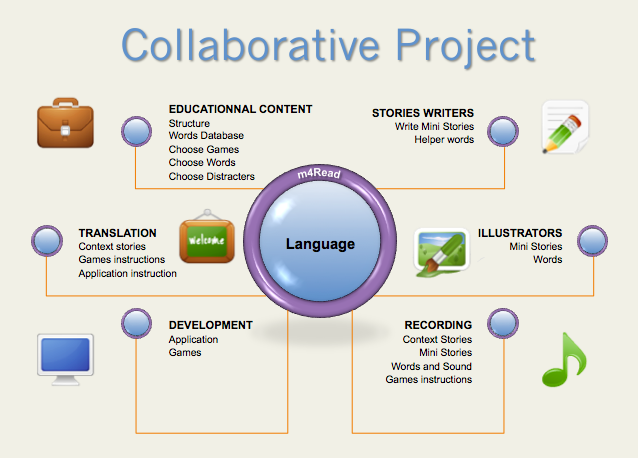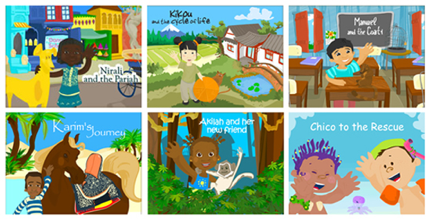Creating Indigenous Language Content with Universal Design In Early Literacy
iLearn4Free Inc is a 501C3 non-profit, whose mission is to bridge the digital language divide and support cultural sustainability by creating digital educational applications in multiple languages for early literacy.
Current situation:
Despite the fact that 94% of the world’s children are not native English speakers, there is a shocking absence of digital educational tools for early literacy in languages other than English.
There is now overwhelming evidence that children benefit from receiving early education in their own language, known as mother tongue learning, as learning to read in a language they do not speak can be very discouraging.
Mother tongue learning also has many social benefits. In multilingual societies, all communities feel equally respected if their language is used in schools, and learning in their mother tongue fosters a child’s capacity to express cultural identity.
iLearn4Free believes all children should have access to digital learning games in their mother tongue, as digital learning is an engaging and efficient way for them to learn and remain motivated.
A Multicultural Approach:
To meet our objective, our main challenge was to create an application that is adaptable to—and accessible by—a multitude of languages and cultures, while keeping costs at a minimum to enable a sustainable deployment.
The development of the application template is the result of an international collaboration between writers, designers and educators from many different nationalities; most of the work was performed through online collaboration.
Leaders and project managers often fail to see cultural differences for what they truly are: engines for creativity and innovation, we believe that a truly diverse and multi-cultural team is an indispensible tool when trying to achieve a universal design in the field of education.
To enable a worldwide deployment, we have chosen to integrate cultural diversity within our application. Instead of being culturally contextualized, we have written six stories with six different international characters that integrate cultural specificities, while staying close to children’s usual concerns: nature, animals, friendship, family, and more. Providing the context for the educational games, these stories are the result of a collaborative creative writing project, which involved about 10 individuals from 5 different nationalities.
Education in Linguistic Context:
The educational content itself, on the other hand, is developed exclusively with reading specialists, linguists, teachers and writers natives to the specific language.
The building process is very structured to ensure that the educational content can be integrated within our template. This has enabled us to be very efficient, and it has provided the team with a sense of comfort and security, which is important in the context of total virtual teamwork.

For the languages, which already have a lot of existing material using a structured learning approach close to the phonemic/syllabic approach, the task of creating the educational content is fairly easy. We are currently well under way for English, French and Spanish. German and Portuguese should follow shortly.
For languages which are not systematically taught in schools—or for which the teaching method is not close to phonemic/syllabic approach—then creating content will require more expertise, and this will be the case of some of the developing world languages.
We are currently starting to work on Papiamento and Malagasy, two languages that are suitable for the interactive learning games, but which have a very different history in terms of their usage in education. We are hoping to set up a process enabling us to be efficient even in these fairly extreme cases.
Financial sustainability
The sustainability of the project is based on the assumption that the apps will be sold in countries where the population can afford it, and will be free in the developing world. Nevertheless, even if the population has the financial means and has access to the technology, if a small number of people speak the language, the development might not be sustainable. This is why we look at a global sustainable model. Common resources enable the cost reduction approach: graphics, app structure and educational games are used for all the languages.
The application has been initially developed for the iPod to ease the pilot phase, during which the educational content is to be validated, and then it will be deployed for other platforms including a web-based approach.
Conclusion
I believe that a global social enterprise approach is an interesting way to tackle the lack of educational content in languages other than English. While trying to create the equivalent of PBS Kids for non-English speakers is probably a far-reaching goal, I hope our application will encourage other educational content providers to take into account the entire population, and give the opportunity to learn through games to every child in their own language.


Sounds wonderful! I hope your application is successful. (Loved the video clip of Manuel and the Coatis)
Jonathan, I would be happy to try to develop the app in any language and indigenous language from Australia as well, I just cannot finance the educational part, but if you think you can find partners, I am open for potential collaboration. Contact me through my website http://www.ilearn4free.org
Isabelle
Bravo!
Congratulations Isabelle !
Great initiative. Perhaps the iEARN (International Education and Resource Network) can help with both translation and local content, having organizations in over 130 countries now.
Ed, I would be very happy to collaborate with iEARN, even if I would not call it a translation, for each language the path way to reading is specific, even is we use the same application, it is tailored for each language. Please contact me at isabelle@ilearn4free.org